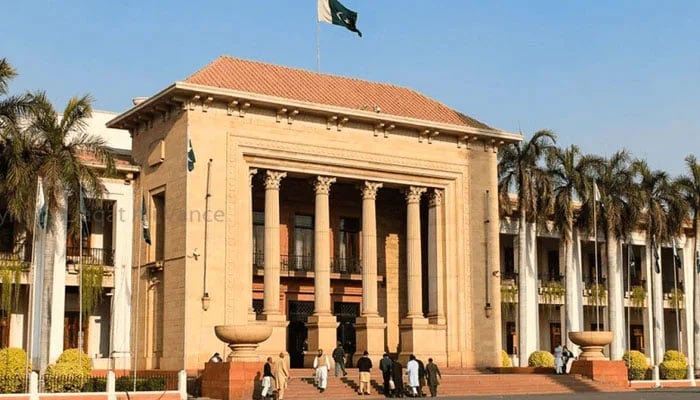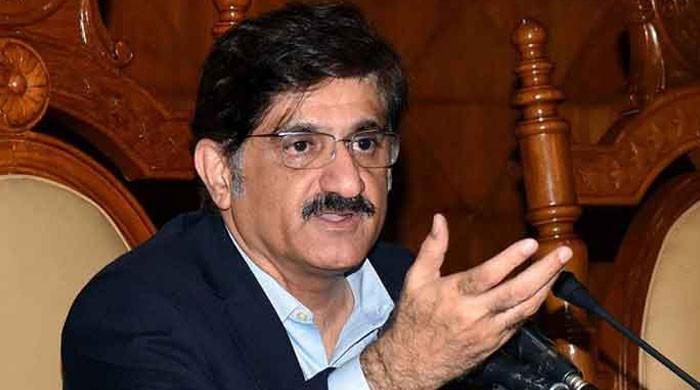Punjab govt bulldozes 'controversial' Defamation Bill 2024
CM Maryam Nawaz-led govt stabbed in our back after holding negotiation over the bill, say journalist leaders
May 20, 2024

- Opposition lawmakers tear copies of “black law”.
- All amendments proposed by opposition rejected.
- Punjab govt stabbed in our back after holding talks, say journalists.
LAHORE: The Punjab Assembly on Monday approved the controversial Defamation Bill 2024 amid a strong and noisy protest by the opposition.
According to the treasury benches, the bill is aimed at stopping fake news, while the media bodies termed it “draconian” in its current form.
Brushing aside the media bodies’ request to differ the proposed bill, Punjab’s Finance and Parliamentary Affairs Minister Mujtaba Mian Shuja-ur-Rehman tabled the bill in the House.
Earlier in the day, representatives of the media bodies met Punjab Information Minister Azma Bokhari and requested her to defer the controversial bill for a few days.
The House witnessed a ruckus and strong protest when the bill was tabled, while the journalists boycotted the proceedings of the House to register their protest.
Journalist leaders were of the view that the government stabbed them in the back after holding negotiation over the bill.
Opposition Leader Ahmed Khan Bhachar said that the Defamation Bill 2024 is a "black law" and his side of the bench would not be partake in passing the legislation.
He made the remarks after all the amendments proposed by the opposition benches were rejected by the House. During the session, the lawmakers from the opposition benches made a noisy protest and tore copies of the bill.
“Subject to the provisions of this Act and any other law for the time being in force, defamation shall be a civil wrong and the person defamed may initiate an action under this Act without proof of actual damage or loss and, where defamation is proved, general damages shall be presumed to have been suffered by the person defamed,” read the bill.
The bill will also apply to fake news spread through YouTube and social media platforms. Under the law, tribunals will be set up to hear the defamation cases. The tribunals will be bound to decide the case within six months.
HRCP expresses grave concerns
The Human Rights Commission of Pakistan (HRCP) has expressed grave concern over the defamation bill.
In a statement, the HRCP said: “The content and language of the bill is troubling on several counts. First, it proposes a parallel structure to adjudicate claims of defamation. HRCP has consistently decried special parallel judicial structures on the grounds that they invariably violate fundamental rights and other universally accepted norms governing the fair functioning of the judiciary.”
Second, the bill proposes to set up defamation tribunals while empowering the government to appoint judges at higher allowances and benefits than what is available to the existing provincial judiciary functioning at the district level, it added.
Third, all defamation claims have to be resolved within a short span of 180 days. The bill proposes authorizing defamation tribunals to issue preliminary decrees to the tune of PKR 3 million — without trial — immediately on receiving a defamation claim.
This will be a huge blow to freedom of expression and dissent. Such orders are likely to be passed without following due process and ensuring fair trials.
Fourth, the draft law creates a special category of holders of constitutional office, such as the prime minister, chief justices and military chiefs, among others.
Defamation claims pertaining to these categories will be heard by special one-member tribunals comprising a judge of the Lahore High Court (LHC). This provision violates the principle of equality of citizens and equality before the law.
The rights body also expressed concern about the haste in which this bill was approved.
“Five days is too short a period for any meaningful consultation with civil society and digital and mainstream media stakeholders on what is a complex legal proposal affecting an entire digital ecosystem of opinion makers,” it added.
‘No compromise on freedom of expression’
Reacting to the development, Lahore Press Club President Arshad Ansari termed the bill as “black law,” saying that they would not tolerate any restriction on the freedom of expression.
Talking to journalists following a meeting of the Joint Action Committee (JAC) of the media bodies, Ansari said they would stage a strong protest against the bill.
“This is not a democratic bill. There is no compromise on press freedom.”
Responding to a question about the future course of action, Ansari said: “We will announce our action plan following another meeting of the JAC.”
He slammed the PML-N-led provincial government for passing the controversial bill.
Speaking on the occasion, the LPC president said that all the media bodies were on the same page over the issue and warned that they would not let the lawmakers enter the assembly.
“You have cheated us. You have trapped us.”
Stressing the need for a detailed and purposeful consultation with all stakeholders, the JAC last week expressed serious concern over the proposed bill in its current form and the proposed federal government “Digital Media Authority”.
In the joint statement, the JAC of the media bodies said: “The media bodies are not against strengthening the defamation laws or regulating digital media after strengthening defamation laws, but the bill appears draconian in its current form and threatens the fundamental right to freedom of expression.”
It had further said that the JAC believed that any legislation in this regard must strike a delicate balance between protecting individual rights and upholding the principles of freedom of expression.
The body had demanded the Punjab and the federal governments to hold extensive discussions with media organisations, and other stakeholders to thoroughly examine the implications of the proposed legislation on freedom of expression and postpone the passing of the bill in the assembly until then.












